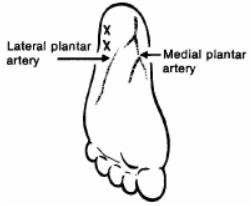A phenylketonuria (PKU) test is done to check for rising levels of phenylalanine.
Phenylalanine is a naturally occurring amino acid essential to growth. After milk or formula (both contain phenylalanine) feedings begin, levels rise due to a deficiency of the liver enzyme that converts phenylalanine to tyrosine.
Due to this metabolic deficiency, poisons build up in the bloodstream and cause mental retardation. If the infant is found to have rising levels of phenylalanine, many protein foods can be withheld from the diet and synthetic foods substituted. The following steps are performed to collect a blood specimen for a PKU test on the newborn infant.

a. Ensure that the infant has been on milk or formula feeding for three full days. Four days are preferred.
b. Explain to the parents the purpose of the test
c. Perform a heel stick to obtain needed specimen (see figure 8-11).
d. Place one drop of blood on each of the three circles on the filter paper or in accordance with local policy.
e. Label and transport the specimen to the laboratory.
f. Notify the parents of follow-up care of the infant, if the infant is discharged prior to his third or fourth day of life. This test must be done.
